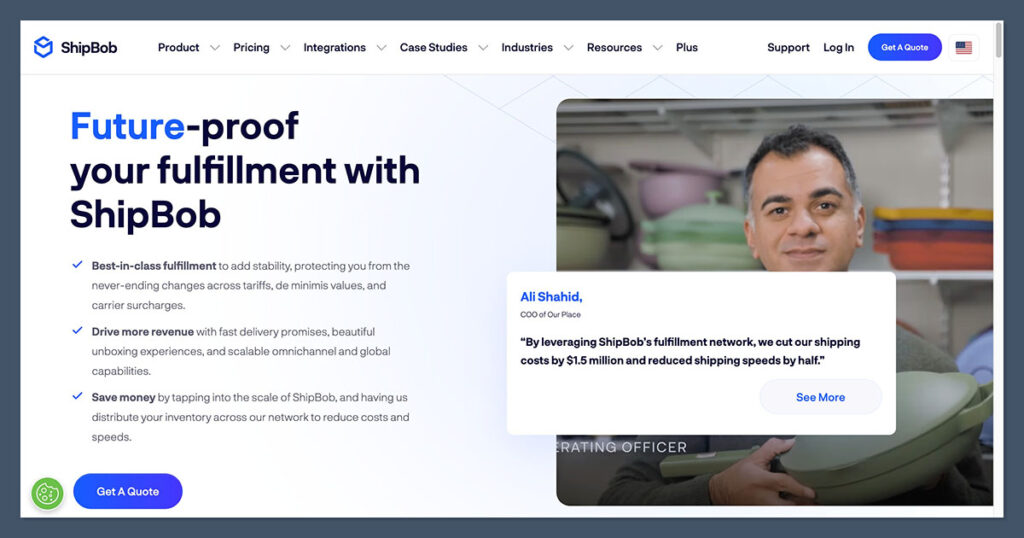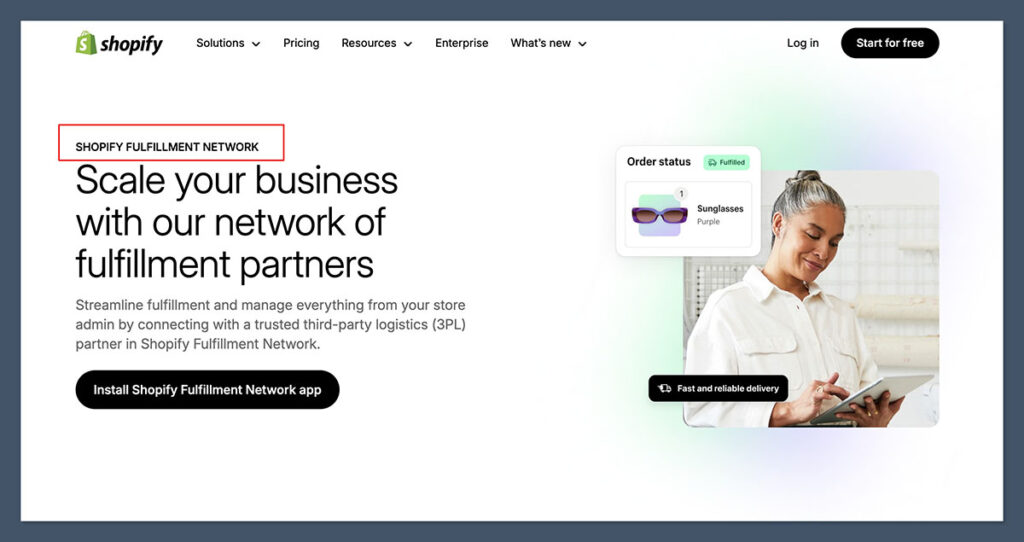ShipBob and Shopify Fulfillment Network are two of the most well-known order fulfillment providers for ecommerce businesses.
But which one is better for your brand?
I’ve spent dozens of hours comparing these platforms across real shipping data, customer feedback, software features, and overall scalability.
If you're a growing ecommerce store looking for reliable shipping, this guide will help you make the right choice.
Quick Verdict: ShipBob vs Shopify Fulfillment Network
ShipBob – Best for multichannel brands and international shipping
Shopify Fulfillment Network (SFN) – Best for US-based Shopify stores with simple logistics
In this review, I’ll compare ShipBob and SFN across fulfillment speed, pricing, integrations, warehouse locations, return handling, and software control — so you can figure out which one actually fits your store’s needs.
Quick Comparison: ShipBob vs Shopify Fulfillment
Let’s start with a side-by-side snapshot of how the two services stack up:
| Feature | ShipBob | Shopify Fulfillment Network |
|---|---|---|
| Platform Support | Shopify, Amazon, WooCommerce, Walmart, more | Shopify only |
| Warehouse Locations | 50+ globally (US, CA, UK, EU, AUS) | Limited to US |
| 2-Day Shipping | Available with multiple warehouse setup | Available for eligible US orders |
| Returns Handling | Full returns suite + automation | Basic returns support |
| Software & Analytics | Detailed dashboard, inventory planning | Basic reporting in Shopify dashboard |
| Customer Support | Logistics-trained reps, live chat | Shopify general support |
| Best For | Multichannel, international, scaling brands | US-focused, smaller Shopify stores |
Best for Platform Flexibility: ShipBob

If you’re selling on more than just Shopify, ShipBob is the clear winner here. Why? ShipBob integrates with:
- Shopify
- WooCommerce
- BigCommerce
- Amazon
- Walmart
- TikTok Shop
- Etsy
- eBay
- Squarespace
Shopify Fulfillment Network, on the other hand, is exclusive to Shopify stores. If you’re planning to sell across multiple platforms or marketplaces, SFN just won’t work.
My experience:
ShipBob's open ecosystem gives more flexibility if you're testing other sales channels or running both DTC and wholesale. It also supports FBA prep if you’re using Amazon alongside your site.
Best for Warehouse Reach: ShipBob
When it comes to geographic coverage, ShipBob comes out ahead again.
ShipBob’s global warehouse network includes:
- 30+ US fulfillment centers
- Facilities in Canada, UK, EU, and Australia
- Real-time inventory sync across locations
- Smart inventory distribution tools
Shopify Fulfillment Network:
- U.S. only
- Coverage limited to select states
- Fulfillment centers managed via Flexport (since Shopify sold its logistics operations)
If your customer base is global or you’re shipping internationally, ShipBob is the only viable option. Shopify Fulfillment just isn’t designed for cross-border expansion.
What also stood out to me with ShipBob is how they handle expansion. If you're entering new markets — say Europe or Australia — you don’t need to start from scratch.
You can use the same ShipBob dashboard, the same order flow, and just add another warehouse location. That level of simplicity can save weeks of setup and integration headaches.
Best for Fast Delivery: Tie

Both ShipBob and SFN offer 2-day delivery across the U.S., but the way they do it is different.
ShipBob 2-Day Shipping:
- You choose which warehouses hold your inventory
- Their software recommends optimal distribution
- You’ll need to stock inventory in multiple regions to ensure coverage
Shopify 2-Day Shipping:
- Available if your products qualify
- Shopify automatically handles the routing
- Only eligible for US-based orders and select SKUs
My take:
If you're looking for simple US 2-day shipping and you're already on Shopify, SFN gets it done with minimal setup. But if you want more control — or international delivery — ShipBob gives you that flexibility.
That said, if you're managing seasonal surges or frequent new product drops, ShipBob’s ability to customize your shipping zones can help you stay agile.
With SFN, you're relying on Shopify’s network logic, which is convenient but doesn’t offer as much hands-on control when your logistics get more complex.
Best for Software and Reporting: ShipBob
ShipBob offers a more advanced fulfillment dashboard, with better visibility and more detailed analytics.
What I liked about ShipBob’s software:
- Real-time inventory and order tracking
- SKU-level insights and demand forecasting
- Automated reorder points
- Multi-location inventory breakdown
Shopify Fulfillment Dashboard:
- Embedded directly in Shopify
- Clean and simple UI
- Basic stats only (orders, tracking numbers, stock levels)
- No predictive inventory planning
If you're managing a large SKU catalog or scaling fast, ShipBob’s software makes fulfillment feel less like guesswork.
One thing that stood out to me was ShipBob’s ability to surface underperforming SKUs and flag inefficient warehouse placements.
These kinds of insights make a real impact on cost-per-order and restocking strategies. Shopify Fulfillment keeps things lean, but that also means fewer data-driven decisions if you're trying to optimize your margins.
Best for Returns Management: ShipBob
Returns are a headache for any ecommerce business — and ShipBob handles them better.
ShipBob’s Returns Process:
- Custom branded returns portal
- Automated RMA creation
- Inspection, restocking, and refund triggers
- Track return reasons and costs by SKU
Shopify Fulfillment Network:
- Uses native Shopify return tools
- No branded return portal
- Manual return tracking for many orders
- Less automation around restocking
In short, ShipBob gives you a full returns system. SFN is workable for small brands, but doesn’t scale well for stores with high return volumes.
ShipBob also lets you set specific rules by product or region — for example, you can automatically restock certain items or trigger a refund only after inspection.
That level of customization helps reduce errors, especially when your returns process starts to involve hundreds of items per week.
Best for Pricing Transparency: ShipBob
Neither platform publishes pricing directly. But based on what I’ve seen from brands using both services, ShipBob tends to be more transparent once you’re in the onboarding process.
ShipBob Typical Pricing (estimates in USD):
- Pick and Pack: First 4 items free, then $0.25 per additional item
- Storage: $10–$40 per month depending on pallet/shelf size
- Receiving: $25/hour or flat rate
- Shipping: Varies by weight, zone, and service
Shopify Fulfillment Pricing:
- Based on shipping zones, product size/weight, and order volume
- Monthly minimum order volume required
- Additional storage fees if inventory sits too long
- Tied to Shopify Payments and certain app dependencies
My experience:
ShipBob offers more visibility during quoting. Shopify’s costs can change based on account size, integrations, and shipping method — so it’s harder to budget accurately.
Another factor worth mentioning is that Shopify Fulfillment pricing can become unpredictable if you’re not consistently moving inventory.
Some brands end up paying penalty fees for slow-moving SKUs or overstocking a product that doesn’t qualify for 2-day delivery.
These hidden costs can eat into your profit if you're not keeping a close eye on inventory flow.
Best for Customer Support: ShipBob
When things go wrong — and they will — support can make or break your fulfillment experience.
ShipBob Support Includes:
- Dedicated onboarding specialist
- Live chat with trained logistics reps
- Account managers for large stores
- Help center, email, and phone
SFN Support:
- Handled through Shopify’s general support system
- Chat and email options
- Less specialized knowledge for fulfillment-specific issues
If you’ve ever had to explain a warehouse issue to a generalist support rep, you’ll appreciate the value of dedicated logistics support. This is where ShipBob really shines.
It’s also worth pointing out that ShipBob offers specialized support during onboarding — not just for setup, but also for demand planning, inventory positioning, and carrier optimization.
SFN’s onboarding is faster, but it’s more self-service. If your fulfillment is mission-critical (which it is), ShipBob’s support structure gives more peace of mind.
Best for Store Size: Depends
Shopify Fulfillment is best for:
- Shopify-only stores
- U.S.-only customers
- Brands shipping under 200 orders/day
- Merchants who want a “plug and play” system with little setup
ShipBob is best for:
- Multichannel sellers
- International fulfillment
- Brands with complex logistics needs
- Stores handling over 500+ orders/month
Also, ShipBob is a better fit for stores with specialized packaging needs, custom bundles, or unique SKUs.
While SFN works well for straightforward product catalogs, it’s not built for handling subscription boxes, bulk wholesale orders, or items with unique fulfillment instructions.
If that’s part of your model, ShipBob gives you more room to grow without switching providers.
Final Verdict: Which Should You Choose?
Here’s my honest recommendation:
| Store Type | Best Choice |
|---|---|
| New Shopify store, U.S. only | Shopify Fulfillment |
| Scaling fast, 5+ sales channels | ShipBob |
| International customers | ShipBob |
| Small, low-SKU catalog on Shopify | Shopify Fulfillment |
| Subscription boxes or wholesale | ShipBob |
If you're just starting out on Shopify and want simple 2-day shipping in the U.S., SFN can get the job done.
But if you're planning to scale, sell in multiple regions, or manage logistics more actively, ShipBob is a better long-term solution.
Also, keep in mind that switching fulfillment providers later is not always easy.
Re-shipping inventory, re-integrating software, and retraining your team can be time-consuming and costly.
That’s why it's better to choose a partner that can grow with you from the start — even if it means a bit more setup work upfront. ShipBob gives you that room to scale without hitting platform limits too early.




Comments 0 Responses